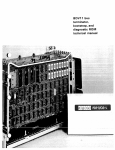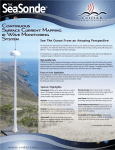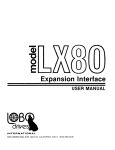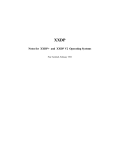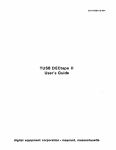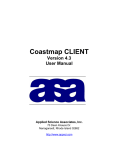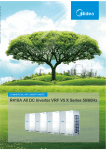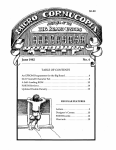Download Calendar Clock for Your LSI-11 System You Need the Q
Transcript
When You Need More Than Just a Calendar Clock for Your LSI-11 System You Need the Q-Timer CALENDAR CLOCK This function provides tenths of second , seconds , minutes, hours, days, day of week, month , and year with automatic leap day insertion . LINE TERMINATORS Removable 180/390 ohm resistor DIP pacs provide proper termination for the LSI-11 bus. HARDWARE BOOT The 4K x 16-bit EPROM memory is organized as sixteen 256-word pages. Boot codes for popular devices are included as well as calendar clock routines and Q-Timer diagnostics. CMOS MEMORY The 2K x 16-bit CMOS RAM , organized as eight 256-word pages , is used to store critical information during power failures and fluctuations. 60 HZ LTC This circuitry generates a stable 60 Hz Line Time Clock interrupt (BEVNT) thus eliminating dependence on the power line frequency. DEC compatible. NI-CAD BATTERIES Rechargeable batteries provide 60-day minimum back-up power for the calendar clock and CMOS CRYSTAL OSCILLATOR A stable 32,768 Hz crystal oscillator serves as a reference for both the calendar clock and the 60 Hz LTC. AUXILIARY CONNECTOR This connector provides a buffered oscillator output. Provision is also made for external oscillator, battery, and LTC inputs. PARALLEL PORT 8-bit buffered input and 8-bit latched output are provided. Control signals and 4 address lines allow user expansion to 16 input and 16 output ports. Input data lines are terminated . For those real-time applications where a CMOS calendar clock is absolutely essential-such as data acquisition, process control, automated testing, medical systems, and a variety of unattended operations-there are no gray areas when it comes to performance and reliability. You will find some extra reassurance from selecting the Q-Timer from Codar's Computer Products Division, because the people who developed and build it also use it in their own scientific systems where there is no compromise on quality. Codar's user background also introduces a valuable systems orientation to designing a multifunction board to enhance DEC LSI-11 systems. There is no wasted board space. The calendar clock is just one element of the Q-Timer's capability, and the integration and application flexibility is unparalleled in the DEC system environment. There's a non-volatile random access memory on-board. There's all the software in EPROM you need to put the calendar clock to work immediately, plus leftover room for user-defined functions. There's a line time clock (LTC). There are parallel I/O ports. In fact, some application specialists have replaced up to four dual-wide modules with the Q-Timer. There simply isn't another product like it anywhere in the world. The calendar clock chip itself contains 16 registers to provide tenths of seconds, seconds, minutes, hours, days, day of week, month and year, with automatic leap day insertion. Additional circuitry creates a 60 Hz LTC to generate a stable interrupt that eliminates dependency on the power line frequency. Both the calendar clock and LTC use a 32.768 KHz crystal oscillator for reference. A byte-addressable, 2K x 16 bits CMOS RAM memory, divided into eight pages of 256 words each (referenced via the I/O page), may be used for data and/or parameter storage. The feature is particularly important to users of RSX-11 Sand other systems without disk storage. Both the calendar clock and RAM are backed up by an on-board, Ni-Cad battery pack (with recharging circuit) that will maintain the CMOS devices in an operational state for a minimum of 60 days (typical 75 days). These are not the flat button cells frequently used in CMOS applications, but are special high-temperature devices designed specifically for long-life low-current, float-charge applications. Separate 8-bit parallel input port and 8-bit latched parallel output port provide a path by which the Q-Timer can perform a variety of I/O functions in addition to routine calendar clock tasks. Ports are expandable by the user to eight 8-bit input and eight 8-bit output. The Codar Q-Ti mer was developed by systems specialists to be a multi-dimensional problem solver, not just another hardware component. As an example, the majority of software required for integration is contained in on-board EPROM, thereby eliminating expensive and time-consuming program development. In addition to a self-diagnostic routine that provides a go/no go verification of RAM, calendar clock and LTC, the EPROM software monitor has bootstrap routines for RL01 /02, RK05, RX01/02, RM02, TU58 and TM11 storage devices. The monitor provides an interactive user-friendly environment for selecting various boot devices, diagnostics and user-generated routines, while automatically printing date and time on powerup. The free Q-Timer documentation contains simple program listings that allow integrating calendar clock functions into RSX-11 M or RT -11 operating systems. Absolutely no SYSGEN or patching of your operating system is required. Flexibility in configuration planning is another added dimension of the Q-Timer. Q-Timer devices can be disabled or their I/O address locations changed to fit specific configurations. Three modes of LTC operation may be selected by on-board jumpers. You get 16, 18 and 22-bit compatibility, with source code listings available to simplify customized applications. Need more convincing? How about a 50-page user's manual written by system integrators for system integrators. How about a six-month warranty. How about direct telephone counsel on special application problems. Still have questions? Great. We have factory experts and sales representatives who can't wait to hear from you. We look forward to being challenged by your application. COMPUTER PRODUCTS DIVISION Codar Technology's Computer Products Division develops, manufactures, and markets enhancement products for LSI-11 data acquisition systems. Representative of the product line are the Q-Timer; a HI-REL system chassis designed to function under difficult environmental and power conditions; graphic display subsystems using true vector generation techniques; and specialized data acquisition systems with supporting software. The parent company, Codar Technology Inc., is the original developer of the Coastal Ocean Dynamics Radar system which is used by commercial and governmental oceanographic interests to measure ocean surface conditions with high-frequency radar. The experience of developing, integrating and field supporting a highly-sophisticated end-user system incorporating an LSI-11 processor necessitates the design of components and subsystems that are not available from commercial sources. These products are now available to other DEC users through the Computer Products Division. TECHNICAL SPECIFICATIONS Module Size: Operating Power: Operating Temperature: Relative Humidity: Bus Loading: Batteries: Battery Back-up: Battery Life: Clock Accuracy: Address EPROM: Boot EPROM: CMOS Memory: I/O Response Time: 60 Hz LTC Phase Jitter: Parallel I/O: 5.2" X 8.9" dual-wide 5V ± 5% 1.2 Amp with bus terminators 0.7 Amp without bus terminators O°C - 50°C 5 - 95% noncondensing 1 LSI-11 bus load per I/O line 3 x 1.2 Volt Ni-Cad, 180 ma hours 60 days minimum, 75 days typical 3-5 years typical 8 seconds/month typical error, 15°C to 40°C 4096 x 8-bit, one 2732, 450 ns maximum access time 4096 x 16-bit, two 2732s, 450 ns maximum access time 2048 x 16-bit static CMOS RAM 9 fJ.s maximum 0.2% maximum (33 fJ.s), non-accumulating TTL compatible, 120 n input termination STANDARD REGISTER ADDRESS ASSIGNMENTS REGISTER LTC Control Calendar Clock EPROM Memory EPROM Page Select Register CMOS Memory CMOS Page Select Register Parallel Inputs Parallel Outputs LSI-11, RL01/02, RK05, RX01/02, RSX-11 M, RT-11, RM02, TU58, and TM11 are trademarks of Digital Equipment Corporation. Q-Timer is a trademark of Codar Technology Inc. Publication No. 130-0100-01 © 1983 Codar Technology Inc. Printed in U.S.A. I/O ADDRESS 777546 777300-777336 773000-773777 777340 766000-766777 777342 777240-777276 777200-777236 Codar Technology Inc. 1428 Florida Avenue Longmont, Colorado 80501 (303) 776-0473 ATTRIBUTE Write Only Read/Write Read Only Write Only Read/Write Write Only Read Only Write Only TECHNICAL UPDATE Your hung system problems are over! The Q-Timer now has a unique "watchdog" timer which will automically re-boot your LSI-11 system in the event a hardware or software problem prevents normal code execution. Various ti me delays from less than one second to over 18 minutes can be selected for the re-boot interval using on-board jumpers. The watchdog circuit is prevented from performing a re-boot by simply reading address 777340 at least once during each selected time interval. The required read operation is easily implemented without modification or patching of your operating system. If desired, the watchdog can be disabled with a single jumper. Almost any application from data acquisition to dial-up time-share can benefit from this new feature. It provides great protection against soft memory errors, static discharge, or peripheral problems and may save you an emergency service call at 3:00 A.M. MEMORY DIAGNOSTICS We have added a memory diagnostic to the Q-Timer's interactive software monitor. This diagnostic provides automatic memory sizing and completed pass reporting on up to 4-million bytes of main memory while performing Iworst-case testing. On unmapped systems, memory will be tested up to the limit of 56 KB. If the processor has memory management hardware, it will be employed to test memory up to the limit of 248 KB on 18-bit systems,'or4088 KB on 22-bit systems. This feature is a great time-saver, as it eliminates the requirement for stand-alone DEC diagnostics, distribution media and documentation. The memory diagnostic is selected for execution from the QTimer monitor as the "MD" device. SSC 11/21 SUPPORT The Q-Timer monitor now provides an enhanced version of Digital's MACRO-ODT for use with the SBC 11/21 (FALCON). The Q-Timer lets you build 11/21 systems that include ODT while allowing you to usethe 11/21 's memory sockets, making them unavailable for other uses.) If you're considering using a Falcon in your application, please give us a call. APPLICATION NOTES "Q-Notes," a series of short technical articles prepared by CTI, can show you some of the ways the Q-Timer will give your system a competitive advantage. And be sure to let us know when you find an interesting job for your Q-Timer to perform-we'll add it to the "Q-Notes." LSI-11 and FALCON are trademarks of Digital Equipment Corporation. Q-Timer is a trademark of Codar Technology, Inc. Publication No. 130-0102-02 e 1984 Codar Technology, Inc. Printed in U.S.A. Codar Technology, Inc. 1428 Florida Avenue Longmont, Colorado 80501 (303) 776-0472





